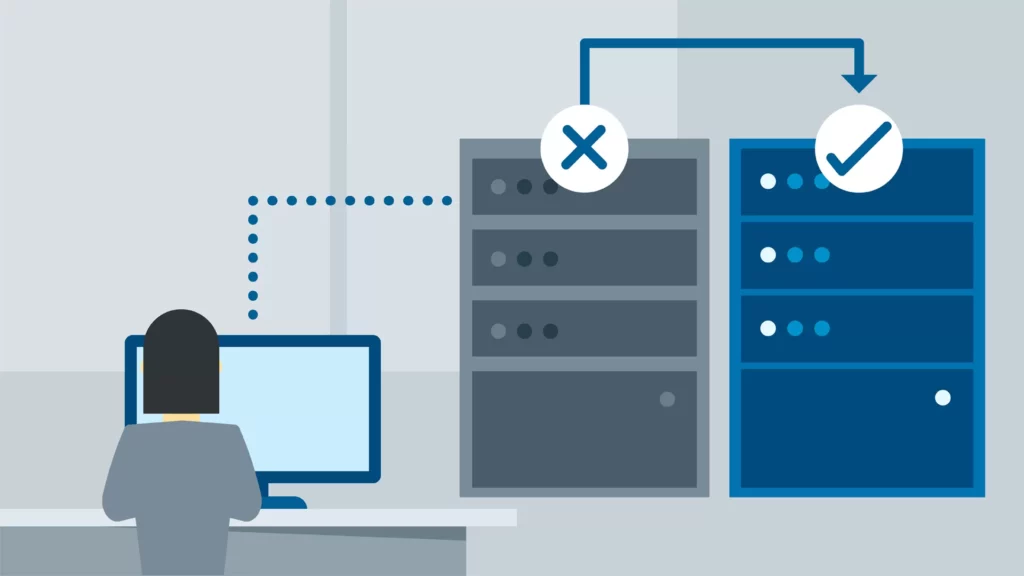Are server and hosting the same thing?
Often, the names “hosting” and “server” are used like synonyms. But they are different concepts: hosting implies renting the power of a computer, and a server is a computer.
What is a server?
You are probably familiar with the term “server. Maybe you even use it regularly. But can you also define it? “Server” comes from the English language and means “servant. The English verb “to serve” means “to offer something to someone.” A server is always part of the so-called client-server model. A client is a user on the network who wants to do something: run a text program, play a game, send an e-mail. The service the client wants to use runs on the server. So the client makes a request to the server – and it fulfills the request and opens the desired program, runs a game, or sets up access to the mailbox.
Thus, various services, programs and data are stored on a server that (usually several) users can access. There are two main types of servers: hardware server and software server.
A software server is a program that is used by other computers or programs (clients) on the network and that can provide various services. A hardware server is a server as most people think of it: it is a physical machine that is part of a network and on which several programs and applications are installed. These, in turn, are nothing more than software servers. Thus, a physical server can have several software servers.
What is web hosting?
The term “host” can have different meanings and is used in several contexts. When it comes to hosting, hosting or hosting, many people first think of web hosting. This means providing – hosting – web space, for example, for a home page. You must rent this web space from a web hosting provider to be able to store your website with all of its content so that it can be accessed at any time and from anywhere over the Internet. The storage space for your website, in turn, is on a powerful server with a hosting provider.
In addition, the server itself can be a host, namely, if different software is deployed on the physical hardware server. This host server then usually represents the center of the relevant network. This role as the central control point of a computer network, and the term “host” used for it, originated back in the 1960s. In the mainframes used at the time, the host represented the center on which all data lay. Users could access and retrieve data on the host through simple operating terminals. In the late 1980s, the mainframe system evolved into a network of several independent computers. The host was increasingly referred to as a server to better differentiate the terms in this system.
Server and hosting functions
The network structure in companies is often built around a host as the centre. The host – that is, the central server – provides all necessary services to the computers (clients) on the network. For example, this host server may run a mail server used by the company to receive, retrieve and send email. In addition, there may be a file server that stores all the files and documents. And other child server software may be installed on the host.
Servers in large data centres that provide computing power to multiple clients can also be called host servers. A single physical server, consisting of disks and other infrastructure on which the virtual servers of multiple clients are deployed, is a host server in this case. Similarly, with more space and computing requirements, you can rent your own server as a host for your system in STRATO, which provides all the services needed for your company. This is why it is now common to talk about a host server (or even just a host) when referring to the central control point of an all-encompassing network.
What is a server for?
A web server is a type of software that performs certain tasks on behalf of users. Recently, though, the term server has also been used to refer to the computer on which the software runs. Essentially, it is a computer or computer machine that is responsible for “serving” or sending information to other related items (computer machines, computers, or people called clients). This allows content to be hosted that can be distributed in a variety of ways, with the Web site being the most common, although recently content distributed through mobile applications has become particularly important. Several different hosts can be hosted, but not vice versa, as we will see later.
What is hosting for?
Hosting or web hosting is the space where a website is placed so that it can be seen by everyone. It is a storage service provided by servers. Simply put, it is the housing of your website in an apartment building. Next, we’ll look at the most common types of hosting.
What is the difference between server and hosting?
As we have seen, there are many differences between web server and hosting, but then, in general, we will tell you about the most notable differences.
Different elements
While a web server is a computer or machine (physical or virtual) that is connected to the Internet and offers various resources, hosting is just a storage space on a server that uses certain technical resources. That is, as a rule, the server has more technical resources than hosting.
The number of hosts on the server
Hosting can share the same IP address with other hosts (or web hosts) on the server on which they are located. And there can be more than one host within a server, but not vice versa.
Price
Because servers usually have more varied and advanced technical resources than web hosting, they usually have higher prices. Nevertheless, it is a recommended option if you want to have more control over the resources it offers. In addition, hiring a server avoids sharing an IP address with other hosting companies. This increases download speeds and avoids certain processes or malware affecting your site.
Service
Another distinguishing feature is their maintenance. While hosting maintenance tasks are usually handled by the company itself, which has a maintenance contract, this is different in the case of servers. It will vary depending on the type of server contract or contract signed. Therefore, there are cases where servers are managed and maintained directly by the hired company, while in other cases it is the customer who has to take care of the maintenance.
In short, if, after knowing the basic differences between server and hosting, you find that your thing is not to manage this type of system, the best option, if you have a standard website, is to choose a hosting service that is cheaper and more valid for your needs. Now keep in mind that there are very different prices on the market for hosting; before choosing the cheapest one, also compare aspects such as storage space, bandwidth or the number of websites you will be sharing hosting with.
If you have a website with a lot of traffic and features, you may be interested in exploring different hosting options for optimal web performance.

Types of server and hosting
Types of web servers
There are many types of servers, but the most relevant are:
- Web server or HTTP server: Through HTTP communication, it is responsible for organizing and distributing Web pages to clients. For example, web browsers.
- File server: stores and distributes different types of computer files to clients on the same network so that more people can access the same information.
- DNS server: allows you to translate host names into corresponding IP addresses, which helps people remember domain names instead of numeric sequences such as IP addresses.
- Mail server: allows receiving, storing and sending messages (emails) between users.
- Proxy server: acts as an intermediary between client connections and the destination server, filtering data packets. If the client is you, that means the proxy collects your requests to access this or that page and sends them to the server, so the server doesn’t know it’s you. For example, instead of establishing a direct connection between your browser and the website, the server will know not your IP address, but the proxy’s IP address. It is usually used, for example, to access content blocked in a certain country.
- Database server: allows different programs or computers to access one or more database systems
- Print servers: allows you to use one or more printers remotely, independent of your computer, instead of using a pen drive to send information to the printer.
- Security Server: allows you to protect your computer from unwanted attacks or intrusions.
Types of hosting
There are several types of web hosting, although the most common are:
- Free hosting: This is free web hosting, but with very limited resources or features. In addition, they are funded by the advertising they place on your site, which can damage your image. It is usually used for experimentation and learning, not for serious projects.
- Shared hosting: multiple websites are hosted on the same server, so the cost and resources of that server are shared. It is used for websites without special requirements or very high web traffic. The main disadvantage is sharing space with other websites, and that is that if the website you share hosting with is penalized for spamming, for example, all the websites you share hosting with will also be affected. Similarly, depending on the security measures of the hosting provider, if other pages have errors or exceed the consumption of other hosting users, the others may also be affected.
- Dedicated hosting: This is a server dedicated only to an account or client. All server resources are available.
- VPS (Virtual Private Server): the real server is divided into several virtual servers. It is used as if it were a non-shared server to which only we have access. The truth is that you share the real server (and its resources) with other virtual servers.
- Cloud hosting: the resources of multiple servers, which for us act as a single server, are pooled. This type of web hosting has several advantages. One of them is its flexibility, as it allows us to dynamically and in real time adjust the resources used by our website according to your needs at any time. Another advantage is that it is very reliable due to the fact that if one of the merged servers fails or stops working, another one replaces it immediately so that the hosted websites continue to work properly. It’s also a good option because you pay for the resources actually consumed rather than a flat fee.
- Hosting Reseller: This is the type of hosting created by companies to resell hosting. You are given unlimited permission to manage your own server in order to resell it. With this type of hosting, you can create accounts that you can then sell to third parties.






